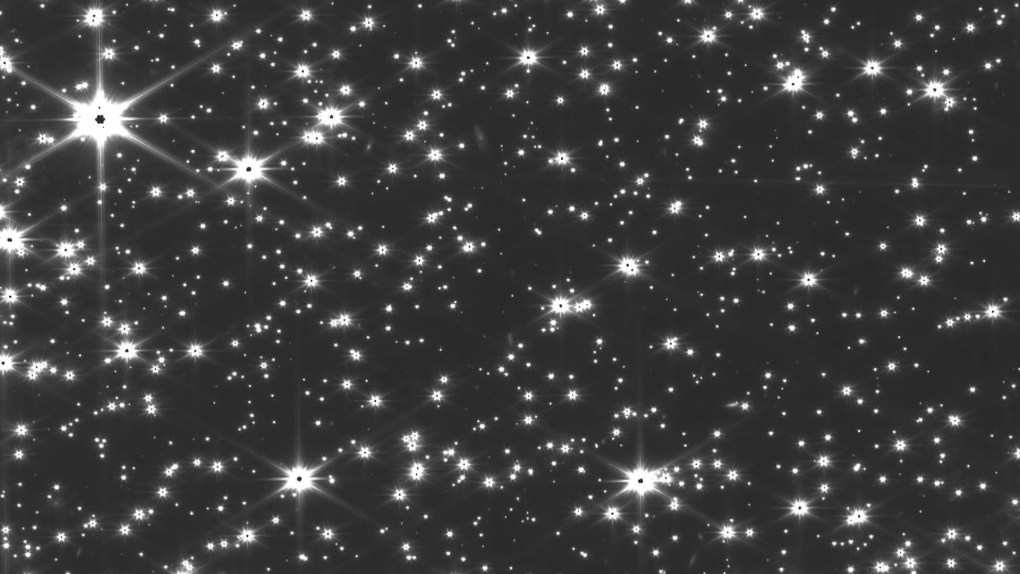Vancouver astronomer gains access to prestigious James Webb Space Telescope for research
 An image from the James Webb Space Telescope captured for UBC astronomer Dr. Jeremy Heyl's research.
An image from the James Webb Space Telescope captured for UBC astronomer Dr. Jeremy Heyl's research.
It took years and a series of failures before Dr. Jeremy Heyl gained access to space exploration's holy grail.
"We had applied for a bunch of different programs, maybe five or six different ones, and this was the only one that was successful," said Heyl, a professor of physics and astronomy at UBC.
Since the James Webb Space Telescope (JWST) launched in December 2021, researchers across North America and Europe have been vying for access to it.
"We received over seven times more requests than we have time for," said Nathalie Ouellette, outreach scientist with JWST Canada.
"So, it's seven to one odds on if someone will get time on it or not."
The $10 billion JWST is considered revolutionary. It can capture images of stars that are thousands of light-years away.
Heyl's project involves observing stars approximately 12,000 light-years away and searching for ancient planetary systems.
"So these stars (that are) like our sun are stars that were born right at the beginning of the universe – close to the beginning of the universe – so it would be really great to know if there were planets forming 10 billion years ago," said Heyl. "Could there have been life in our galaxy like us but five billion years ago? Or more?"
Ouellette tells CTV News that since the telescope has been operational, new research and discoveries have occurred at a rapid pace.
"It's kind of putting into question either our understanding of how galaxies form or maybe even the fundamental laws of physics and how the universe works," said Oullette.
Heyl says his research is far from over. He is expecting to receive new images generated by the telescope in the near future.
CTVNews.ca Top Stories

B.C. tenants evicted for landlord's use after refusing large rent increase to take over neighbouring suite
Ashley Dickey and her mother rented part of the same Coquitlam duplex in three different decades under three different landlords.
Mountain guide dies after falling into a crevasse in Banff National Park
A man who fell into a crevasse while leading a backcountry ski group deep in the Canadian Rockies has died.
Expert warns of food consumption habits amid rising prices
A new survey by Dalhousie University's Agri-Food Analytics Lab asked Canadians about their food consumption habits amid rising prices.
MPP Sarah Jama asked to leave Ontario legislature for wearing keffiyeh
MPP Sarah Jama was asked to leave the Legislative Assembly of Ontario by House Speaker Ted Arnott on Thursday for wearing a keffiyeh, a garment which has been banned at Queen’s Park.
Charlie Woods, son of Tiger, shoots 81 in U.S. Open qualifier
Charlie Woods failed to advance in a U.S. Open local qualifying event Thursday, shooting a 9-over 81 at Legacy Golf & Tennis Club.
Ex-tabloid publisher testifies he scooped up possibly damaging tales to shield his old friend Trump
As Donald Trump was running for president in 2016, his old friend at the National Enquirer was scooping up potentially damaging stories about the candidate and paying out tens of thousands of dollars to keep them from the public eye.
Here's why provinces aren't following Saskatchewan's lead on the carbon tax home heating fight
After Prime Minister Justin Trudeau said the federal government would still send Canada Carbon Rebate cheques to Saskatchewan residents, despite Saskatchewan Premier Scott Moe's decision to stop collecting the carbon tax on natural gas or home heating, questions were raised about whether other provinces would follow suit. CTV News reached out across the country and here's what we found out.
Montreal actress calls Weinstein ruling 'discouraging' but not surprising
A Montreal actress, who has previously detailed incidents she had with disgraced Hollywood producer Harvey Weinstein, says a New York Court of Appeals decision overturning his 2020 rape conviction is 'discouraging' but not surprising.
Caleb Williams, Jayden Daniels and Drake Maye make it four NFL drafts with quarterbacks going 1-3
Caleb Williams is heading to the Windy City, aiming to become the franchise quarterback Chicago has sought for decades.

































